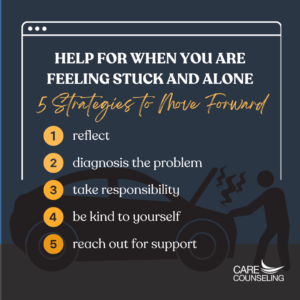Help for When You are Feeling Stuck and Alone: 5 Strategies to Move Forward

If you are at a point where you are feeling stuck in life, there are options even when it feels like you are going nowhere. Imagine you are sitting in a car that is going nowhere. We are going to use this as an analogy of your life.
Perhaps you were running strong–going places at a steady pace to the destinations along your journey. You’ve done some amazing things with special people. Lately, your car does not seem to have the same power that it used to. You are not as interested in the things that previously brought pleasure. You start to neglect taking care of your vehicle. Necessities such as fuel for the engine eventually stall you out. You are no longer moving and feel stagnant. The journey has taken a turn to where you are alone and not going anywhere.
Maybe you were never good at tuning into what your vehicle needed. Just like our body gives us signals of stress and burnout, so do machines. You drove it hard to where the system became overloaded. Maybe your vehicle was already in rough shape. If you are experiencing chronic medical conditions, persistent mental illness, or have a history of trauma, perhaps you can relate. Self-sabotage may be present. Fear and resistance are also common.
The natural tendency is to protect yourself with defense mechanisms such as avoidance. You recognize this showing up and take the courage to face the problem by calling an expert who can get out of the vehicle with you and look under the hood. Here are strategies to help move you forward.
Reflect
It is important to reflect on your past, focus on the present, and plan for the next steps. When it comes to feeling stuck and alone, reflection will help bring awareness to what is going on. Tell me a bit about where you have been and where you are now. How are you taking care of yourself? What do you need to feel physically and emotionally strong? Who are the people that can help support you?
Diagnosis the Problem
It is hard to get a car running smoothly without first diagnosing what is going on. A therapist can help identify what is going on after listening to experiences and reviewing your symptoms as part of the assessment process. The next step is treatment planning. This process can help bring hope as there is now a roadmap, along with identified interventions to help you get to your destination.
Take Responsibility
As the driver of your vehicle, you have an important responsibility for the care and maintenance of your emotional and physical well-being. This includes making and keeping regularly scheduled appointments that are part of your treatment plan. Focusing on the basics (sleep, healthy eating, exercise), taking care to protect yourself from dangerous situations, and being prepared to respond to emergencies are all important.
Be Kind to Yourself
Be kind to yourself and your vehicle (your body). Self-inflicted harm, negative thinking, engaging in reckless and risky behaviors, substance use, and refusing or avoiding support when needed are ways of self-sabotaging the accomplishment of your goals.
Reach out for Support
Please prioritize your needs and seek support. Therapists are trained professionals who can address the patterns that contribute to feeling stuck and help you set forth on a new path. Let’s sit it in for a while. It is OK. Not everything can always be “fixed” but there is always an alternative such as regulating your response to the problem. You can feel more grounded when it feels like things are spinning out of control. Additional tools, an extra person, and a little push to gain the momentum that was lacking can go a long way.
Written By: Charlotte Johnson, MA, LPCC



























